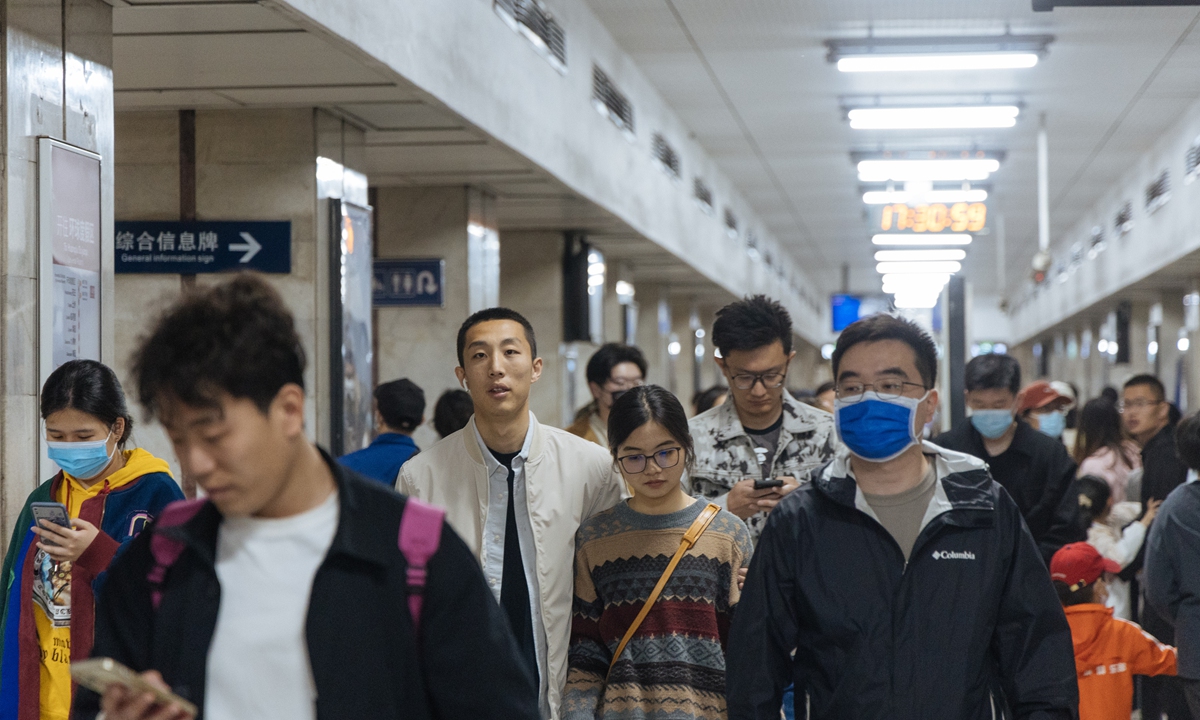
Some passengers are seen without masks in the Beijing subway station on April 16, 2023. Beijing's subway has dropped mandatory mask requirements for passengers, local media reported. Photo: Li Hao/GT
The more times an individual is infected with COVID-19, the higher the risk of sequelae people will face, Gao Fu, an academician of the Chinese Academy of Sciences (CAS) said recently. Gao also believes that long COVID has been a basic fact.
Clinical data have proved this trend, meaning that COVID-19 infected patients should be diagnosed access timely treatment, Gao said at an academic annual conference of National Clinical Research Center for Infectious Diseases on May 13, reported the National Business Daily on Thursday.
The long-lasting effects of COVID-19 infections is a basic fact and people have no need to be shy away from it, according to Gao.
During the post-epidemic era, we can't "be afraid of COVID," but also can't make light of it, Gao said.
Lu Hongzhou, head of the Third People's Hospital of Shenzhen, told the Global Times on Thursday that another major COVID-19 epidemic is "unlikely" to occur in China this year, but the individual infections will continue.
Herd immunity will protect most members of our population, but a few people will still be reinfected. "We have found that the immune escape ability of XBB strain is very strong. It is the top priority currently that we should develop vaccines against XBB strain as soon as possible, especially for the elderly and tumor patients soon," Lu explained.
Some netizens started a discussion online over how to deal with the situation in case of reinfection. Some people have been suffering from COVID-19 for a second time recently, while others are showing similar symptoms, such as a sore throat.
The currently circulating XBB strain variant is a recombinant of Omicron. The data show that its transmissibility and immune escape ability are stronger than that of the early circulating Omicron variant, but there is no significant changes in its pathogenicity, the National Health Commission said in a report on Wednesday via its WeChat account.
Wang Guiqiang, director of the infectious disease department of Peking University First Hospital, believes that the uninfected people, the elderly, people who have not received vaccines, and people with underlying diseases are the key groups who should strengthen personal protection to prevent infection.
The period of reinfection was shorter, and the fever duration and degree were shorter, and less intense, Wang said, according to the People's Daily. "Those people who were infected in December 2022 still have effective antibodies to protect them, and their symptoms are generally mild even if they are reinfected," Wang said.
Since December 9, 2022, the positive rate of COVID-19 nucleic acid testing in the country increased at the beginning and then decreased, according to the latest report released by the Chinese Center for Disease Control and Prevention on April 29. The number of COVID-19 cases decreased to 2,661 on April 20, and increased in the week from April 21 to April 27, to 6,752 on April 27, said China CDC.
The main COVID-19 strain circulating in Guangzhou, South China's Guangdong Province is XBB1.9.1. According to current data from fever clinics in the city, 20 to 25 percent of fever patients are infected with COVID-19, respiratory disease expert Zhong Nanshan said on May 15, according to media reports.
About 85 percent of the country's population has been infected with COVID-19, which means about 1.1 billion to 1.2 billion people have been infected, according to Zhong. Zhong explained the increase of a person's antibody against COVID-19 means the person has been infected, irrespective of whether they display symptoms or not.


